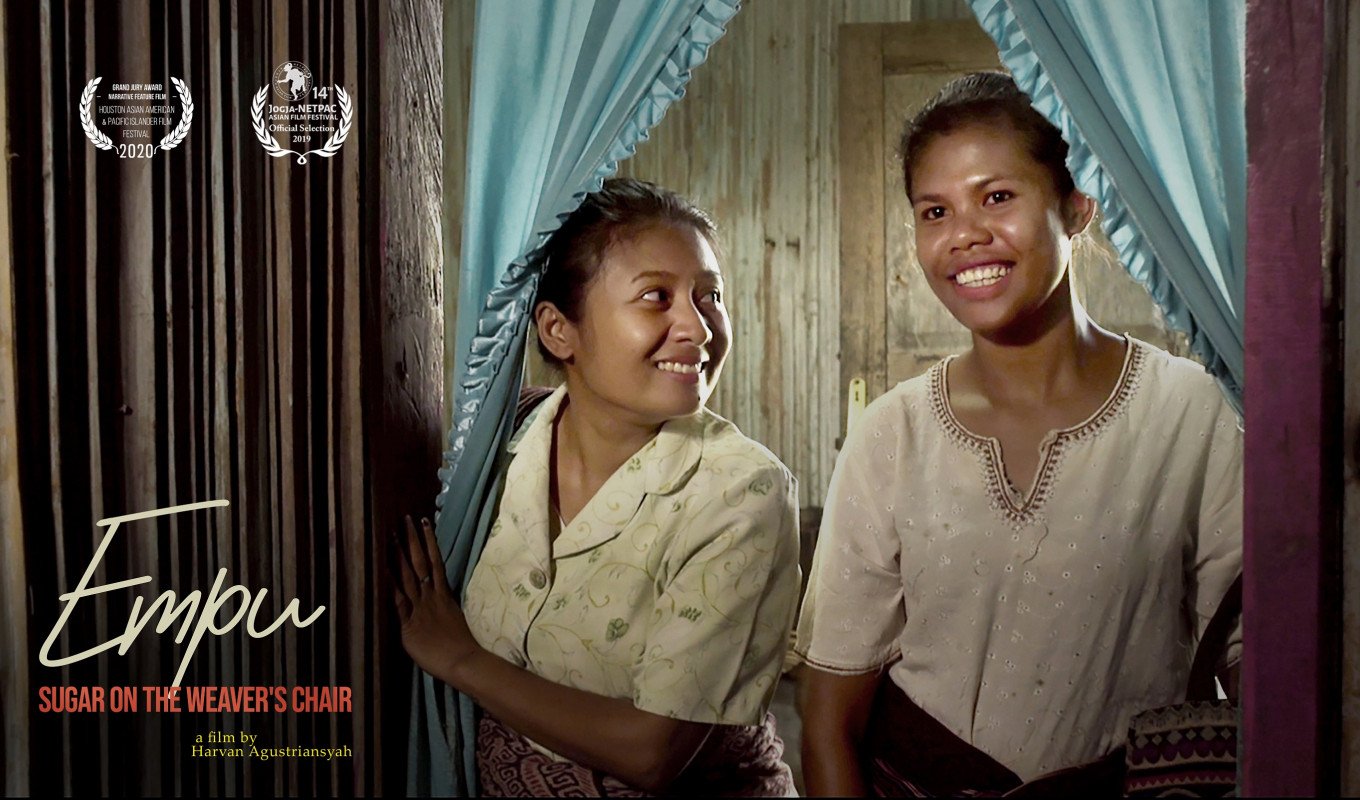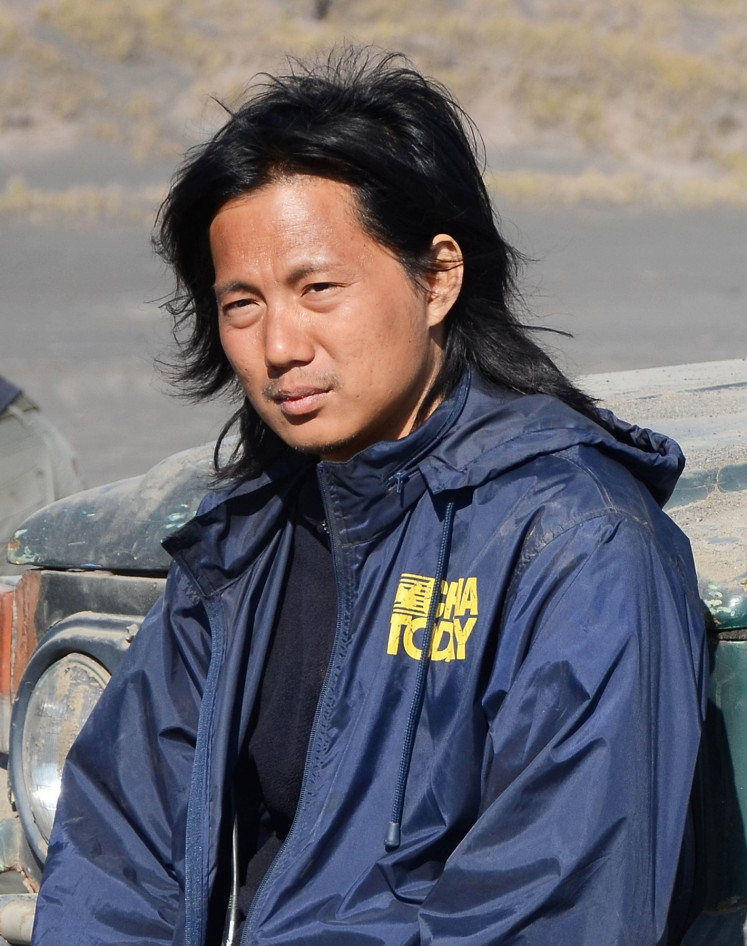Popular Reads
Top Results
Can't find what you're looking for?
View all search resultsPopular Reads
Top Results
Can't find what you're looking for?
View all search resultsHarvan Agustriansyah tells stories, one short film at a time
If budget and approval were not issues, director Harvan Agustriansyah would like to film more social-political dramas.
Change text size
Gift Premium Articles
to Anyone
I
f budget and approval were not issues, director Harvan Agustriansyah would like to film more social-political dramas to add to his portfolio.
“It’s films like ‘Empire of the Sun’, ‘The Pianist’, or ‘The Revenant’. During my studies at the Jakarta Arts Institute in 2007, my graduation film was about politics, which none of my friends there were doing at the time,” he recalled during an interview with The Jakarta Post.
Harvan Agustriansyah. (Harvan Agustriansyah/-)Orde, the film in question, is a 25-minute short about an Indonesian and a foreigner. When their car breaks down, the Indonesian driver has to fix the car while dealing with the passenger, who adamantly refuses to step foot outside.
The short film’s reception was favorable. Orde was screened at film festivals around the world, including the 2009 Tehran International Short Film Festival and the 12th Shanghai International Film Festival in 2009.
Social and political issues have held Harvan’s interest since that time. His works include the 2015 film Biang, which deals with a lapo (Bataknese restaurant) selling dishes made of dog meat and the fate of a dog and her three pups, as well as the 2016 film Pangreh and its exploration of paid mobs recruited for demonstrations.
Harvan’s latest award-winning film is also about social issues. The 2019 feature film Empu: Sugar on the Weaver’s Chair, which recently won the Grand Jury Award for Narrative Features at the 2020 Houston Asian American Pacific Islander Film Festival in June, tells the story of three different women in different villages who do not know each other but share the same fate of having to face a major problem in life.
While Empu may seem like a documentary, it is, in fact, a work of fiction, although it is based on true stories.
According to Harvan, the idea came from community-based business organization Terasmitra, which usually does documentaries and profiles. This time around, the organization wanted to do a fictional film, and Empu became their first.
“Since Terasmitra has small and medium enterprise members throughout the nation, they wanted to tell these members’ stories, and they contacted me. I’m always enthusiastic about new work, and they were quite brave to do a 60-minute fictional film,” he explained.
Harvan noted that all three stories in the film stayed as close as possible to their real-life counterparts, although there were some humorous moments added in for emotional balance.
“The story took some time to prepare. As a filmmaker, I have to make the film palatable to a wider audience, and not just able to be enjoyed by the community. I didn’t want to make the story out to be a community or advocacy film. I wanted the movie to be enjoyable by general audiences who might not know about the issues or the people,” he said.
The stories follow palm sugar farmer Sutringah (Annisa Hertami), who becomes her family’s breadwinner after her husband is injured; Yati (Tiara Arianggi) and her lurik (traditional striped cloth) weaving despite discrimination because of her disability; and Maria (Putry Moruk) and the efforts of a number of widows’ to revitalize Biboki tenun (handwoven cloth) amid a land dispute over her building.
Harvan said that Maria’s story – based on the late Maria Yovita Meta Bastian and her Tafean Pah Foundation – was the hardest story to handle as he needed to determine the urgency of the issue.
“I talked with Bu Yovita for three hours and researched more about her, and I found out that she had a great concern about ‘tenun’ and culture and [believed] that people should care about these issues from a young age,” he said.
“She told me that in one school she saw, ‘tenun’-related extracurricular activities were nonexistent, and that advocating for a ‘tenun’ extracurricular was not without its obstacles.”
While Harvan’s main interests lie with these human-interest stories, he has also tried his hand at other genres, such as horror, which he did for one segment, called Loket (Locket), in the 2012 Hi5teria collection of separately directed vignettes.
“I make films because I like the themes and the issues, along with the desire to tell the story to the audience. It’s as simple as that. If I’m asked about what genre I’d like to make movies in, it could be anything: horror, drama, politics,” he said.
“As for ‘Hi5teria’, I had the story beforehand, and I was offered to be one of the five directors. For me, it was a challenge. I was not a director who had done horror before, but it was part of being a filmmaker.”
Filmmaking came later for Harvan. As a young boy, he wanted to become a jazz musician. He watched films while he played the guitar.
“When I was six or seven, my father would put on Charlie Chaplin films, so unbeknownst to me, I was exposed to movies throughout my entire life. The movies I remembered the most were the Indiana Jones films and ones by Steven Spielberg,” he said.
Harvan plans to create a new short film despite the ongoing pandemic. He will fund it personally. The reason for this, he said, was because investors were generally not interested in short films.
“I see short films as an investment. When we spend money to fund a work, we’ll see a return at some point later on. That might not be how investors see shorts, though.”












